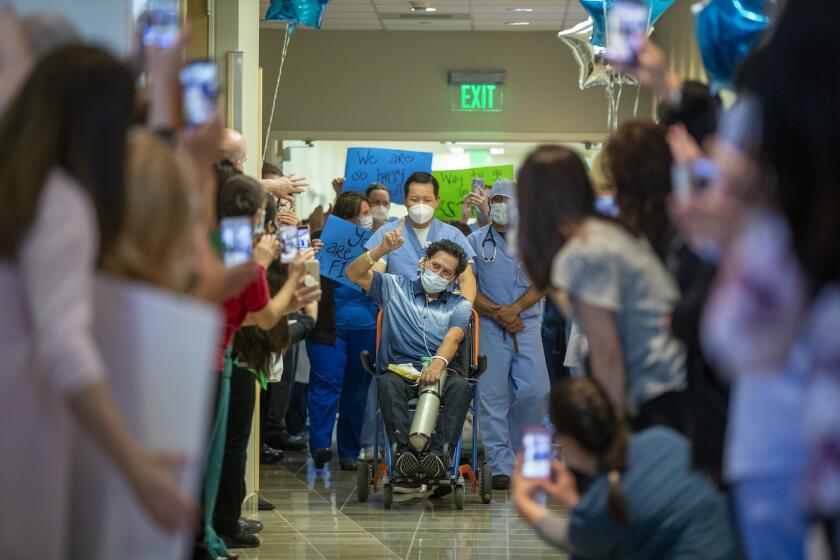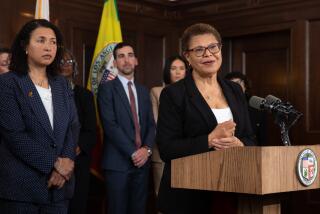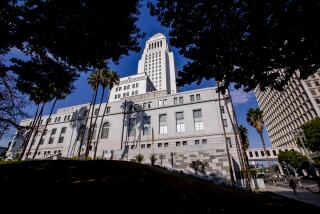Garcetti: L.A. is ‘under attack’ and will need to furlough thousands of city workers

In his annual State of the City address, Mayor Eric Garcetti announced plans for furloughs of thousands of city workers.
- Share via
Mayor Eric Garcetti warned Sunday that the economic downturn facing Los Angeles will be more painful than the 2008 recession, requiring cuts to government programs and the furlough of thousands of city employees.
In a remarkable State of the City address, one that comes five weeks into the shutdown of many businesses, government buildings and other facilities, Garcetti declared that the city is “under attack” from the coronavirus and the economic fallout that has come with it.
“I’ve never before hesitated to assure you that our city is strong,” he said. “But I won’t say those words tonight. Our city is under attack. Our daily life is unrecognizable.
“We are bowed and we are worn down. We are grieving our dead,” the mayor continued, choking back tears. “But we are not broken.”
These are some of the unusual new scenes across the Southland during the coronavirus outbreak.
The mayor’s remarks represented a jarring break from previous State of the City speeches, when he offered overwhelmingly uplifting messages. In this year’s address, Garcetti offered a series of grim signposts about the city’s immediate future: joblessness, a collapse in hotel reservations and a 95% drop in passenger air travel — all products of the coronavirus outbreak.
The city has already borrowed $70 million from special funds while responding to the health crisis. To balance the city budget, civilian city workers will need to take off 26 unpaid days — the equivalent of a 10% reduction in pay, the mayor said.
“From a fiscal perspective, this is the worst it’s ever been,” he declared.
So far, the city’s political leaders sounded open to the reductions being sought by Garcetti.
Councilman Mike Bonin said that, considering the extent of the economic calamity facing the region, he was relieved that the mayor was not announcing layoffs. Councilman Gil Cedillo described furloughs as the best in a series of bad choices, but worried that residents and city employees would suffer.
“City services are in greater need during a crisis,” said Cedillo, who represents parts of the Eastside.
How acutely the public will feel the cuts is far from clear. Furlough days will not be demanded of police officers, firefighters or workers at the Department of Water and Power, among others. Trash pickup will remain intact, a Garcetti aide said.
The mayor has already closed a number of city facilities to the public, including cultural centers, the Los Angeles Zoo and scores of branch libraries. Some city employees have been reassigned to work in recreation centers operating as makeshift homeless shelters.
A 20-story residential tower planned in downtown Los Angeles is at the heart of a federal probe involving a developer who allegedly arranged a $500,000 bribe for a City Council member, a Times analysis shows.
One union leader voiced dismay over the cost-cutting plans, saying his members have been called into duty as emergency workers, helping to relocate the city’s homeless population and working at coronavirus testing centers. Adding more instability for those workers will hurt the city, said Bob Schoonover, president of Service Employees International Union Local 721.
“We cannot call these men and women heroes and then turn around and attempt to balance the budget on their backs,” said Schoonover, whose union represents custodians, tree trimmers and others.
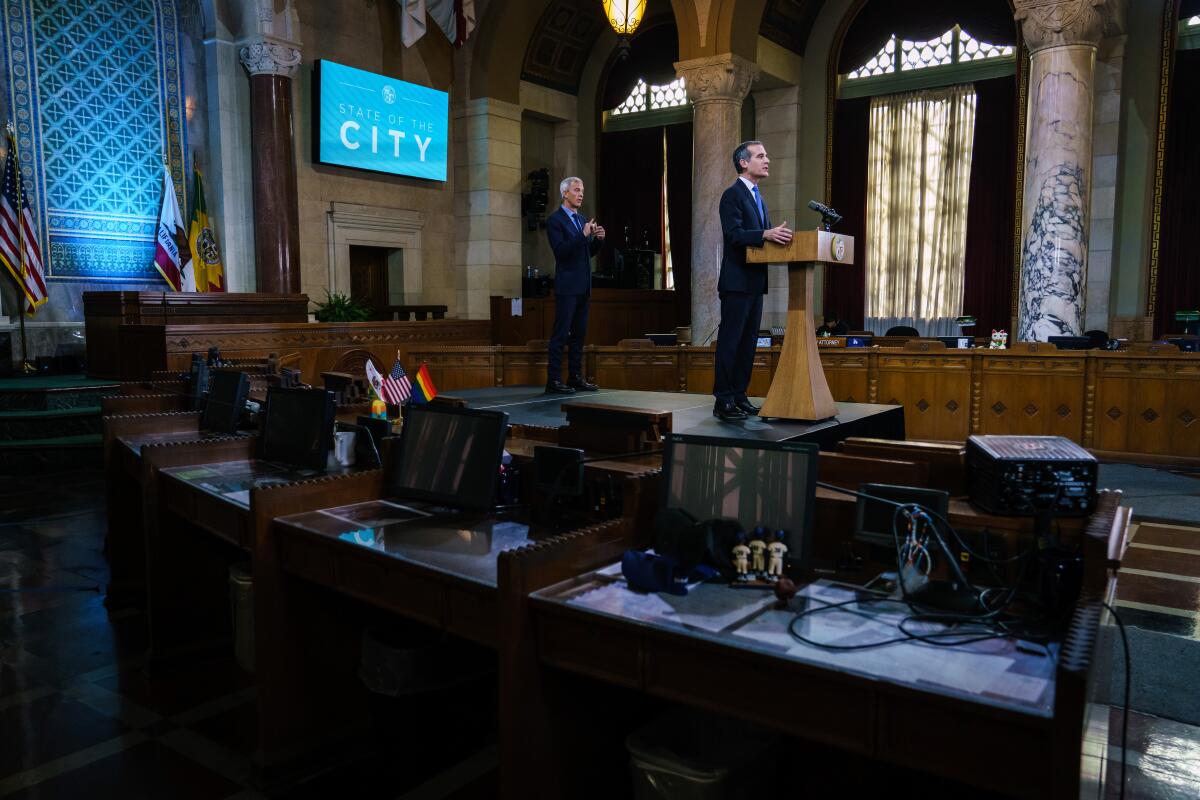
Sunday’s address comes at an extraordinary time for Garcetti and the city. Over the last five weeks, the mayor has issued emergency orders to close businesses, halt evictions, require face masks, waive parking tickets and generally keep Angelenos away from each other on beaches, hiking trails and in other locations.
With much of the city staying indoors, Sunday’s speech bore little resemblance to previous State of the City addresses in L.A. Gone was the color guard, the Pledge of Allegiance and the other ceremonial flourishes that typically accompany Garcetti’s yearly address to the city.
In normal years, Garcetti has delivered the address before hundreds of people in packed venues such as the California Science Center and the Valley Performing Arts Center at Cal State Northridge. On Sunday, he spoke inside a mostly empty City Council chamber, with even council members staying at home.
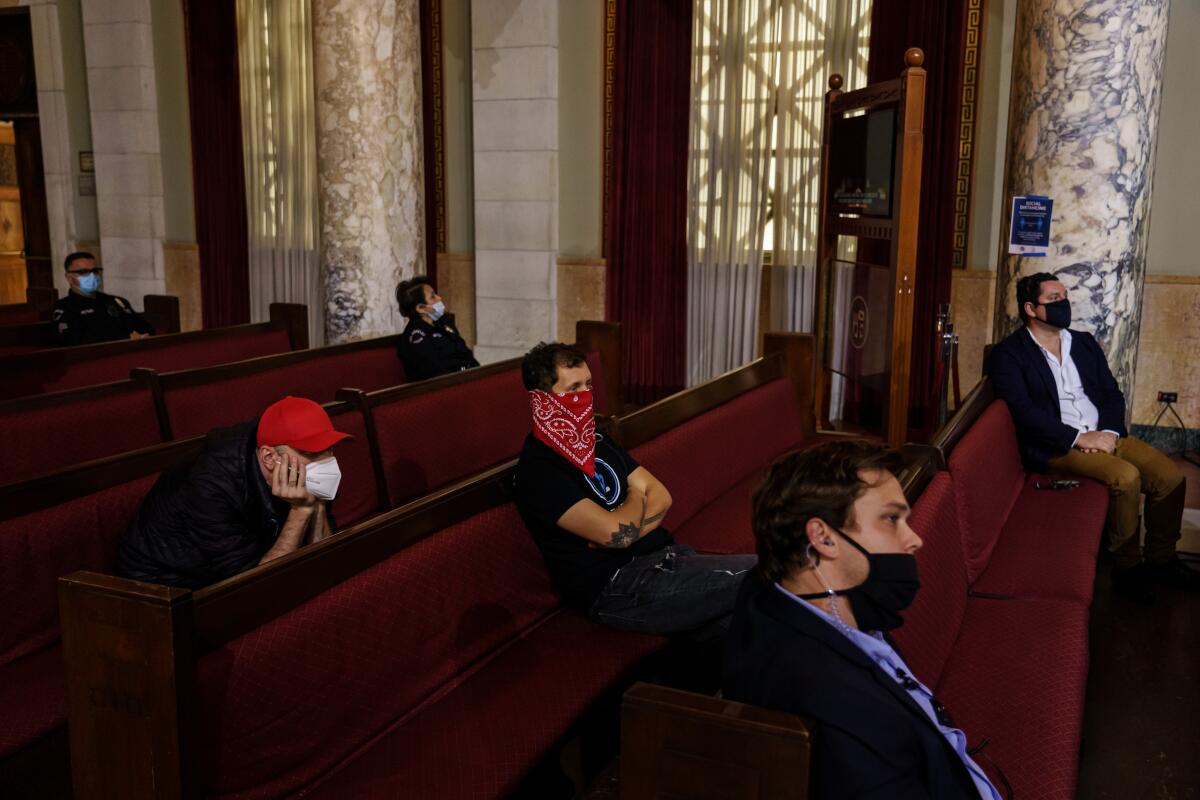
As a result, the event felt closer to one of the many evening coronavirus briefings given by Garcetti since mid-March. However, the overall message was more grim, with Garcetti saying the city would need major help from the federal government to weather the crisis.
“Don’t bail out banks but leave cities with cuts and collapse,” he said.
Garcetti said Congress should pass a national infrastructure bill to put people back to work. And he called on the federal government to loosen restrictions on emergency funds that prevent the city from using them to replace lost revenue.
The coronavirus outbreak and accompanying economic downturn pose by far the biggest challenge to Garcetti and other city leaders since the 2008 recession. During that crisis, the city’s elected officials responded by imposing furloughs, laying off hundreds of workers and eliminating thousands of jobs.
“Until now, it was the biggest economic blow of our lifetime, and it hurt,” Garcetti said. “But there’s no way to sugarcoat this. This is bigger. It will hurt more.”
Revenue for the coming budget year could be as much as $598 million below projections, depending on how long Angelenos continue staying indoors, according to figures released last week by City Controller Ron Galperin.
Much of the reductions have been caused by the steep drop-off in tourism activity, including a major decline in projected hotel bed taxes, Galperin said. Since stay-at-home orders were issued across the state, unemployment claims have skyrocketed, with workers in the entertainment, hospitality and travel industries hit particularly hard.
Garcetti is scheduled to release his proposed budget Monday. The document, which covers spending for the fiscal year that starts July 1, must be approved by the City Council before it can go into effect.
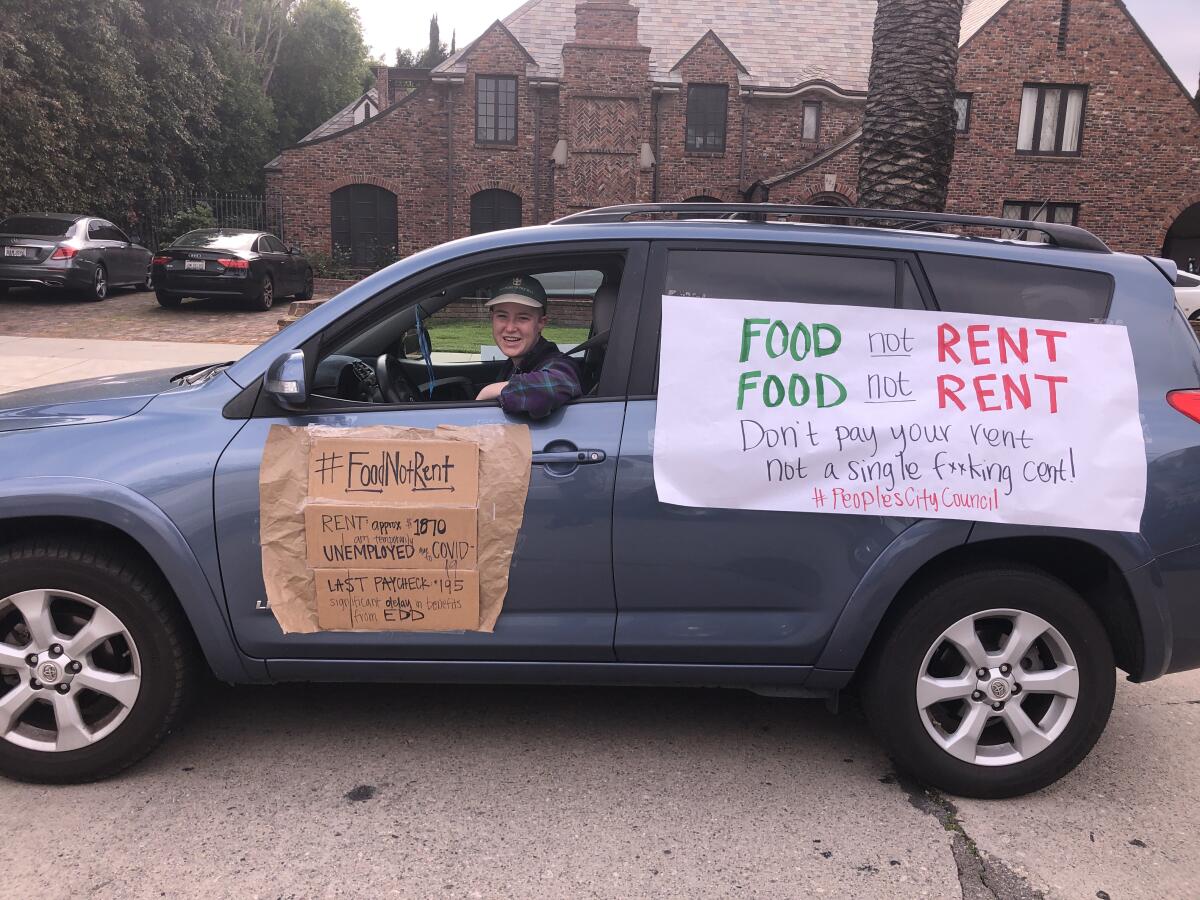
While Garcetti delivered his address, activists staged a protest outside Getty House, the mayor’s official residence in Windsor Square, calling on him to use his emergency powers to order the cancellation of rent payments and fill vacant hotels with homeless Angelenos.
As drivers repeatedly honked their horns, dozens of sidewalk protesters from the Los Angeles Tenants Union and other groups chanted, “No rent, no rent!” Hollywood resident Kat DeVoe-Peterson, who was recently laid off from her job at a bar in Silver Lake, said Garcetti needs to secure federal funding for renters in the city.
“It’s not just about me, it’s about everyone,” said DeVoe-Peterson, driving a car with the sign “Food Not Rent.”
Josh Rubenstein, a Los Angeles Police Department spokesman, said 11 citations were issued during Sunday’s protest. Some drivers who repeatedly honked their horns were cited for violating an “amplified sound” ordinance. Two protesters on the sidewalk were also detained and cited, police said.
Garcetti said in recent weeks that he has been pressing lawmakers in Washington, D.C., to approve a stimulus package that safeguards both renters and landlords from a massive financial collapse. During his address, he said federal funds should specifically be used to back the suspension of rents and mortgages.
The mayor said the federal government also needs to tackle problems that hurt Americans well before the coronavirus outbreak — depressed wages, crippling college debt, a lack of access to healthcare.
“We must ask of our city and our nation at this time, is ‘normal’ really what we want to come back to?” he asked.
More to Read
Sign up for Essential California
The most important California stories and recommendations in your inbox every morning.
You may occasionally receive promotional content from the Los Angeles Times.
